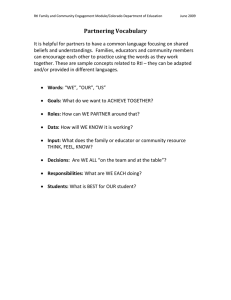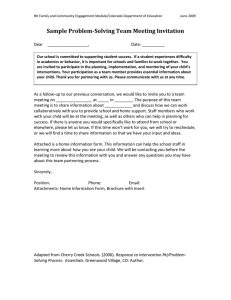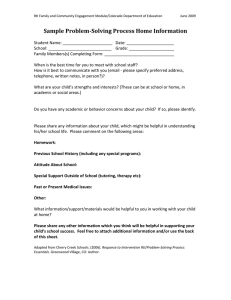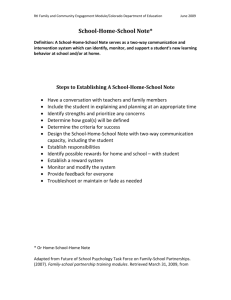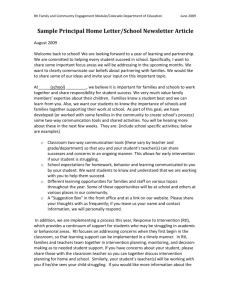Document 15590423
advertisement
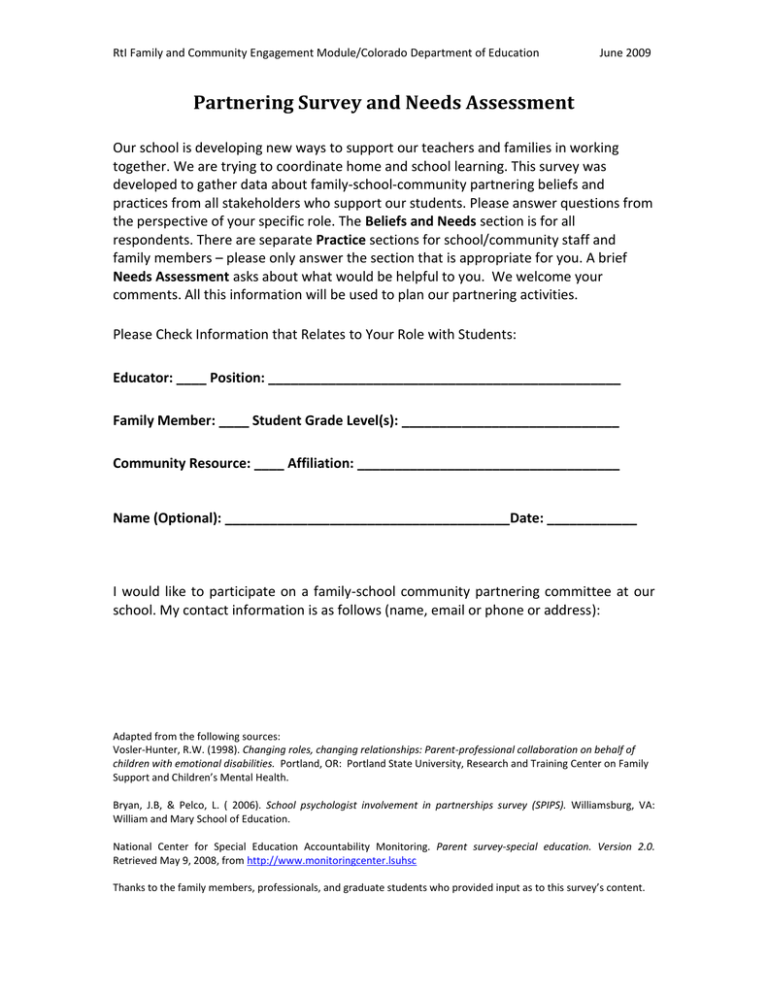
RtI Family and Community Engagement Module/Colorado Department of Education June 2009 Partnering Survey and Needs Assessment Our school is developing new ways to support our teachers and families in working together. We are trying to coordinate home and school learning. This survey was developed to gather data about family-school-community partnering beliefs and practices from all stakeholders who support our students. Please answer questions from the perspective of your specific role. The Beliefs and Needs section is for all respondents. There are separate Practice sections for school/community staff and family members – please only answer the section that is appropriate for you. A brief Needs Assessment asks about what would be helpful to you. We welcome your comments. All this information will be used to plan our partnering activities. Please Check Information that Relates to Your Role with Students: Educator: ____ Position: _______________________________________________ Family Member: ____ Student Grade Level(s): _____________________________ Community Resource: ____ Affiliation: ___________________________________ Name (Optional): ______________________________________Date: ____________ I would like to participate on a family-school community partnering committee at our school. My contact information is as follows (name, email or phone or address): Adapted from the following sources: Vosler-Hunter, R.W. (1998). Changing roles, changing relationships: Parent-professional collaboration on behalf of children with emotional disabilities. Portland, OR: Portland State University, Research and Training Center on Family Support and Children’s Mental Health. Bryan, J.B, & Pelco, L. ( 2006). School psychologist involvement in partnerships survey (SPIPS). Williamsburg, VA: William and Mary School of Education. National Center for Special Education Accountability Monitoring. Parent survey-special education. Version 2.0. Retrieved May 9, 2008, from http://www.monitoringcenter.lsuhsc Thanks to the family members, professionals, and graduate students who provided input as to this survey’s content. RtI Family and Community Engagement Module/Colorado Department of Education June 2009 FOR FAMILY MEMBERS AND SCHOOL STAFF/COMMUNITY RESOURCES Disagree Undecided Agree Strongly Agree 1. Believe that families and schools share responsibility for a student’s education. 2. Believe that students should see their teachers and families working together in relation to their everyday school experiences and learning. 3. Believe that schools and families each have areas of expertise/information to share in supporting student success. 4. Believe teachers and family members should communicate regularly about both positive events and concerns. 5. Believe that I have the skills/training to work as a partner in supporting school success for students. 6. Believe that teachers and family members should share concerns when either sees a student beginning to struggle or becoming discouraged. 7. Believe that teachers and family members should each have responsibilities for student planning and interventions when concerns are identified. 8. Believe that students should be partners in home-school communication and in intervention planning. 9. Am confident in my ability to develop and maintain family-school partnerships in my specific role (as staff, family member, or community resource). 10. Know about the Response to Intervention (RtI) process in my school. Strongly Disagree I… N/A Beliefs (What I Think…) 0 1 2 3 4 5 0 1 2 3 4 5 0 1 2 3 4 5 0 1 2 3 4 5 0 1 2 3 4 5 0 1 2 3 4 5 0 1 2 3 4 5 0 1 2 3 4 5 0 1 2 3 4 5 0 1 2 3 4 5 RtI Family and Community Engagement Module/Colorado Department of Education June 2009 FOR FAMILY MEMBERS N/A Not at All Rarely Sometimes Frequently Very Frequently Practices (What I Do…) 1. Participate in problem solving with teachers when there are academic or behavior concerns, then assist with setting goals and developing a plan. 2. Have resources, training and support to help me with the following: encouraging my child in school; providing resources, time and space for homework; talking to my child about school and learning. 3. Use information from home when I discuss my child’s progress, needs, problems, and possible solutions with the school. 4. Know the following for my student’s school, classes and activities: rules, how progress is reported, and homework expectations for students and families. 5. Communicate regularly (two-way) with teachers for positive reasons, routine matters, progress updates, and concerns if needed. 6. Share my student’s strengths, challenges, interests, and attitudes about school with the teachers. 7. Ask teachers what I can do to support my student’s learning in our home or through the community. 8. Have visits in my home from school staff. 0 1 2 3 4 5 0 1 2 3 4 5 0 1 2 3 4 5 0 1 2 3 4 5 0 1 2 3 4 5 0 1 2 3 4 5 0 1 2 3 4 5 0 1 2 3 4 5 9. Feel valued and respected by teachers and school staff. 0 1 2 3 4 5 10. Visit my child’s school. 0 1 2 3 4 5 11. Participate with teachers in the Response to Intervention (RtI) problem-solving process. 0 1 2 3 4 5 I… RtI Family and Community Engagement Module/Colorado Department of Education June 2009 FOR SCHOOL STAFF AND COMMUNITY RESOURCES N/A Not at All Rarely Moderately Frequently Very Frequently Practices (What I Do…) 1. Include families in problem solving when there are academic or behavioral concerns; then set mutual goals, monitor progress, review and revise plan with families as needed. 2. Provide resources, training and support to help families with the following: encouraging their child in school; accessing resources, time and space for homework; talking to their child about school and learning. 3. Use data points from multiple sources when I discuss a child’s progress, needs, problems, and possible solutions. 4. Share with families the following: school, class, and activity rules; how progress is reported; homework expectations for students and families. 5. Ask each family to share about student’s strengths, challenges, interests, and attitudes about school. 6. Communicate regularly (two-way) with families of all my students for positive reasons, routine matters, progress updates, and concerns if needed. 7. Ask parents what they need to actively support student learning in the home and partner with the school or the community. 8. Visit families in their homes. 0 1 2 3 4 5 0 1 2 3 4 5 0 1 2 3 4 5 0 1 2 3 4 5 0 1 2 3 4 5 0 1 2 3 4 5 0 1 2 3 4 5 0 1 2 3 4 5 9. Reach out to families with cultural, language, gender, socioeconomic, and learning differences. 10. Invite families to come to school. 0 1 2 3 4 5 0 1 2 3 4 5 11. Participate with families in the Response to Intervention (RtI) problem-solving process. 0 1 2 3 4 5 I… RtI Family and Community Engagement Module/Colorado Department of Education June 2009 FOR FAMILY MEMBERS, SCHOOL STAFF, COMMUNITY RESOURCES NEEDS ASSESSMENT (What Would Be Helpful to Me….) I would like more information and/or training on the following topics: RtI Creating learning opportunities at home Parenting classes Teacher-family communication strategies Family volunteering opportunities at home or school Involving families in school decision-making Teachers and families working together when a student is struggling School-community partnering Area community resources Conflict resolution strategies for teachers and families Homework strategies Communication with other families Other – Please identify The best time for me to attend workshops or trainings is: Weekday Mornings (Before School) Weekday Afternoons (After School) During School Day Weekday Evenings Saturdays Online Written Workbooks, Materials Other – Please Identify Please share any comments or questions regarding how our school can best support families, teachers, and community resources working together in coordinating student school success.
